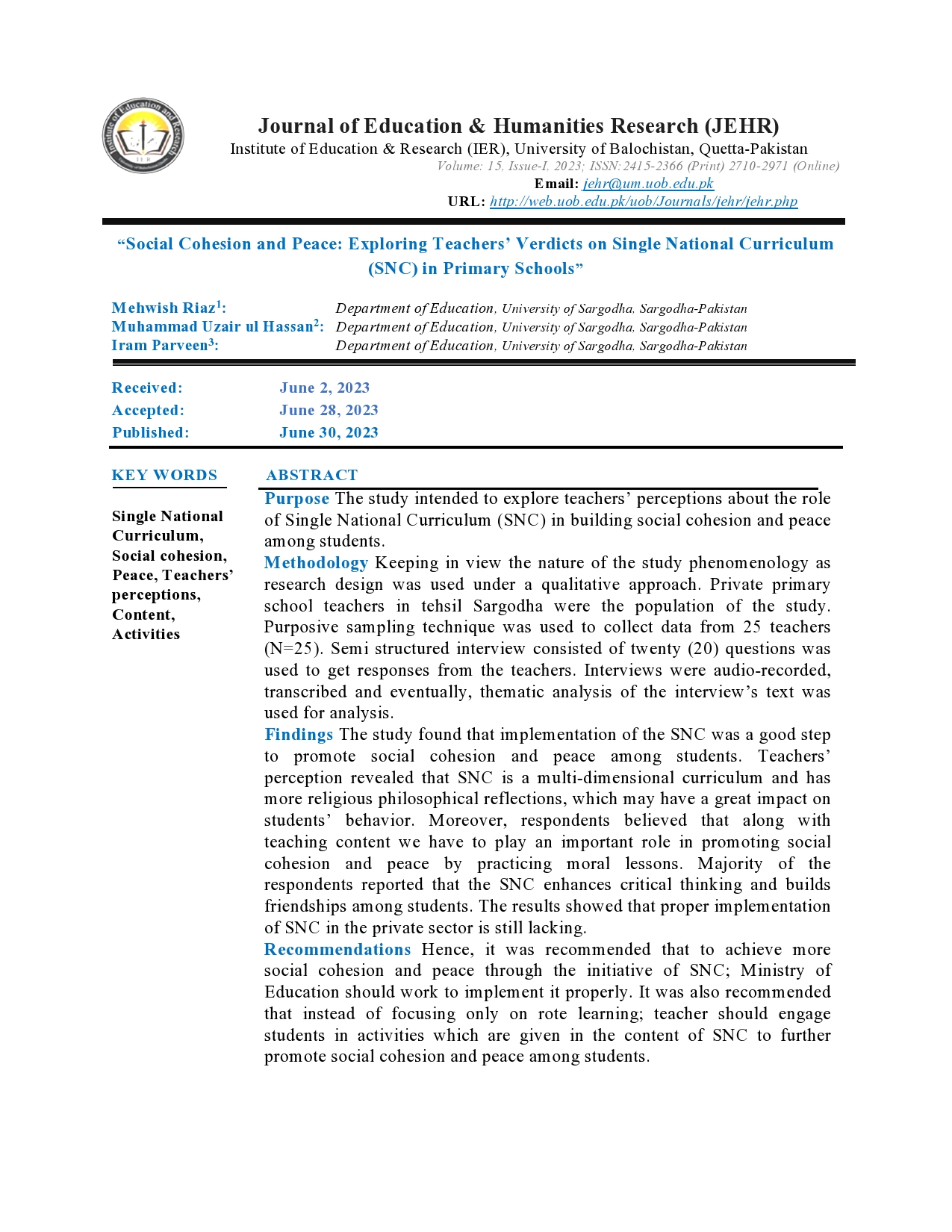Social Cohesion and Peace: Exploring Teachers’ Verdicts on Single National Curriculum (SNC) in Primary Schools
Abstract
Purpose__ The study intended to explore teachers’ perceptions about the role of Single National Curriculum (SNC) in building social cohesion and peace among students.
Methodology__ Keeping in view the nature of the study phenomenology as research design was used under a qualitative approach. Private primary school teachers in tehsil Sargodha were the population of the study. Purposive sampling technique was used to collect data from 25 teachers (N=25). Semi structured interview consisted of twenty (20) questions was used to get responses from the teachers. Interviews were audio-recorded, transcribed and eventually, thematic analysis of the interview’s text was used for analysis.
Findings__ The study found that implementation of the SNC was a good step to promote social cohesion and peace among students. Teachers’ perception revealed that SNC is a multi-dimensional curriculum and has more religious philosophical reflections, which may have a great impact on students’ behavior. Moreover, respondents believed that along with teaching content we have to play an important role in promoting social cohesion and peace by practicing moral lessons. Majority of the respondents reported that the SNC enhances critical thinking and builds friendships among students. The results showed that proper implementation of SNC in the private sector is still lacking.
Recommendations__ Hence, it was recommended that to achieve more social cohesion and peace through the initiative of SNC; Ministry of Education should work to implement it properly. It was also recommended that instead of focusing only on rote learning; teacher should engage students in activities which are given in the content of SNC to further promote social cohesion and peace among students.
References
Ahmad, I., Ali, A., Khan, I., & Khan, F. A. (2014). Critical Analysis of the Problems of Education in Pakistan: Possible Solutions. International Journal of Evaluation and Research in Education, 3(2), 79-84. https://eric.ed.gov/?id=EJ1091681
Government of Pakistan, National Assembly Secretariat, Islamabad. (2010). 18th Constitutional Amendment, UNESCO.(2011). Situation analysis of the education sector. Retrieved from http://unesco.org.pk/education/documents/situationanalysis/National_Final_Report_Education_Policy_Analysis.pdf
Gul, R., & Khilji, G. (2021). Exploring the need for a responsive school curriculum to cope with the Covid-19 pandemic in Pakistan. Prospects, 51(1), 503-522. https://www.ncbi.nlm.nih.gov/pmc/articles/PMC7931495/
Iqbal, K. (2016). Role Of Education In The Social Conflicts Resolution And Peace Building At Secondary Level In Khyber Pakhtunkhwa (Doctoral dissertation, Northern University, Nowshera). http://prr.hec.gov.pk/jspui/bitstream/123456789/7865/1/Khalid%20Iqbal%20PhD%20thesis.pdf
Kantzara, V. (2011). The relation of education to social cohesion. Social cohesion and Development, 6(1), 37-50. https://www.researchgate.net/publication/301315272_The_relation_of_education_to_social_cohesion
Kaur, B. (2012). Equity and social justice in teaching and teacher education. Teaching and Teacher Education, 28(4), 485-492. https://selc.wordpress.ncsu.edu/files/2013/03/Equity-and-social-justice-in-teaching-and-teacher-education.pdf
Masood, K., & Bukhari, M. A. (2016). An Analysis of Students’ Performance at Secondary School Level in Subject of Pakistan Studies at Punjab (Pakistan). J. Appl. Environ. Biol. Sci, 6(4S), 236-244. https://www.textroad.com/pdf/JAEBS/J.%20Appl.%20Environ.%20Biol.%20Sci.,%206(4S)236-244,%202016.pdf
Ministry of Federal Education and Training. (2020). Single National Curriculum (SNC). Government of Pakistan. Retrieved from http://www.mofept.gov.pk/ProjectDetail/MzkyNDc2MjMtY2VjYy00ZDA4LTk5OTUtNzUyNDI3ZWMzN2Rm
Musyoka-Kamere, I. (2013). Revisiting African traditional education to promote peace through education in Africa. Msingi Journal, 1(1), 459-497. https://journal.ku.ac.ke/index.php/msingi/article/view/73
Nayyar, A. H. (2020) Dissecting the Single National Curriculum, DAWN, https://www.dawn.com/news/1572130
Pirzada, G., Aslam, A., & Ahmed, F. (2022). THE DEARTH OF NATIONAL HEROES IN PAKISTAN’S PRIMARY CURRICULUM: FROM THE PREVIOUSLY PRESCRIBED CURRICULUM TO THE NEWLY IMPLEMENTED SINGLE NATIONAL CURRICULUM. Pakistan Journal of Social Research, 4(03), 771-779. https://pjsr.com.pk/ojs/index.php/PJSR/article/view/767




